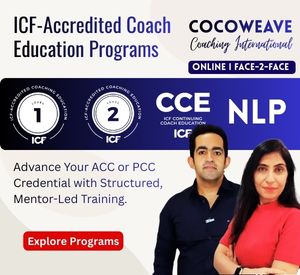This post comes from Dr. D. Ivan Young, an ICF Business Solutions Partner who offers ICF members discounts or special pricing on goods and services as part of their ICF membership benefits.
In a coaching world saturated with frameworks, tools, and credentials, it’s easy to focus outward — on methods, metrics, and mastery. But the most effective coaches don’t lead with technique. They lead with presence. And presence is born from self-awareness.
Self-awareness isn’t just another competency on a checklist. It’s the invisible anchor behind every breakthrough conversation. According to research published in the Harvard Business Review, professionals who demonstrate high levels of self-awareness are “more effective, better communicators, and more trusted by those they work with” (Goleman, 2014). For coaches, this isn’t just an advantage — it’s the very foundation of transformative practice.
Why Coaches Must Lead From the Inside Out
Whether you’re an MCC or working toward your ACC, every coaching session is a co-creative space. Yet how often do we enter that space out of alignment with ourselves? Unprocessed emotions, internal distractions, or subtle attachments to outcomes can all limit our ability to be fully present.
From my experience working with executive and high-performance coaches across industries — from wellness and leadership to organizational development — the most impactful coaches aren’t the ones with the best toolkits. They’re the ones with the deepest integration.
When a coach cultivates inner alignment, they create a mirror through which the client begins to see themselves more clearly. In other words, your self-awareness doesn’t just serve you — it holds space for your client’s transformation.
What Is Self-Awareness in the Coaching Context?
In coaching, self-awareness is the real-time ability to observe one’s internal state while remaining fully present with the client. It means noticing when your ego, assumptions, or emotional triggers enter the session — and consciously choosing to shift.
This Self-Regulation Strengthens the ICF Core Competencies, Particularly:
- Demonstrates Ethical Practice (Competency 1).
- Embodies a Coaching Mindset (Competency 2).
- Maintains Presence (Competency 5).
Self-Awareness in Coaching Operates Across 4 Domains:
- Emotional Awareness: Noticing what you feel and why, without projecting it onto the client.
- Somatic Awareness: Reading subtle physiological cues that may inform or distort your perception.
- Cognitive Awareness: Observing the inner narrative or agenda that may shape your listening or questioning.
- Behavioral Awareness: Tracking how your actions (tone, pace, posture) influence the session dynamic.
According to McKinsey & Company, although 86% of executives say self-awareness is crucial for professional effectiveness, fewer than 20% consistently practice it. For coaches, this gap has direct implications: our lack of inner clarity can inhibit the very change we seek to facilitate.
Why It’s Hard to Stay Present When You’re the Coach
Let’s be honest. Even the most seasoned coaches have moments of misalignment. You might enter a session distracted by personal stress. Or you might find yourself subtly “rescuing” the client to feel effective. You may even withhold a powerful question because it feels risky.
None of this makes you a bad coach — it makes you human.
But to truly serve our clients, we must first get curious about our own internal landscape. We must normalize reflective practice not as a “nice to have,” but as a professional necessity.
A Reflective Practice Framework for Coaches
Here are several evidence-informed practices you can use to elevate your coaching presence through self-awareness:
Pre-Session Centering
Before each session, check in with your body. Breathe. Ask: “What am I carrying into this space that doesn’t belong to the client?”
Post-Session Debriefing
After the session, journal briefly: “What went well? Where did I feel tense or uncertain? What was I avoiding?”
Cognitive Reframing
Notice any stories you’re telling yourself mid-session. Such as: “I need to sound insightful,” or “The client isn’t progressing fast enough.” Shift to a learner’s stance: What’s really emerging here?
Peer Supervision or Mentor Coaching
Leverage safe, skilled spaces to unpack patterns, explore triggers, and stay accountable to your growth.
Ongoing Values Alignment
Revisit your core purpose as a coach. Are you practicing what you preach? Do your habits reflect your philosophy?
These reflective disciplines don’t just sharpen your edge — they deepen your impact.
Coaching Is a Mirror, Not a Microscope
In today’s landscape, clients are not just seeking coaches with credentials. They’re seeking guides with depth. Self-awareness builds that depth. It helps you hold paradox, sit with silence, challenge without ego, and celebrate without over-identifying.
It also protects you from compassion fatigue, role entanglement, and performative coaching.
The best coaches I’ve mentored or trained are not perfect. But they are curious. They’re committed to seeing themselves more clearly — not for the sake of image, but in service of integrity.
Coaching, at its best, is not a performance. It’s a partnership grounded in truth, trust, and transformation.
So the question is not, “How do I sound more like a coach?” it’s, “Who am I being while I hold this space?”
Because ultimately, the coach your client trusts most is the one who’s done the work.
References:
- Goleman, D. (2014). What Self-Awareness Really Is (and How to Cultivate It). Harvard Business Review.
- McKinsey & Company (2020). The Mindsets and Practices of Excellent CEOs.
Note: This article is part of an ongoing series exploring the intersection of coaching practice, emotional intelligence, and transformational leadership.
Disclaimer
The views and opinions expressed in guest posts featured on this blog are those of the author and do not necessarily reflect the opinions and views of the International Coach Federation (ICF). The publication of a guest post on the ICF Blog does not equate to an ICF endorsement or guarantee of the products or services provided by the author.
Additionally, for the purpose of full disclosure and as a disclaimer of liability, this content was possibly generated using the assistance of an AI program. Its contents, either in whole or in part, have been reviewed and revised by a human. Nevertheless, the reader/user is responsible for verifying the information presented and should not rely upon this article or post as providing any specific professional advice or counsel. Its contents are provided “as is,” and ICF makes no representations or warranties as to its accuracy or completeness and to the fullest extent permitted by applicable law specifically disclaims any and all liability for any damages or injuries resulting from use of or reliance thereupon.
Authors
Post Type
Blog
Audience Type
Experienced Coaches, External Coaches, Internal Coaches, New Coaches, Professional Coaches
Topic
Coaching Essentials, Discover - Your Coaching Career
Related Posts
The Power of Active Listening in Meaningful Coaching: Why Active Listening is the Most Essential Coaching Competency
Of all the foundational coaching competencies identified by the International Coaching Federation…
Allyship in Action: Coaching as a Catalyst for Change
Allyship is often framed as a value or an intention. In practice,…
Grace Under Fire: Building Stress Resilience for Coaches and High Achievers
There’s a unique kind of pressure that lives at the intersection of…







